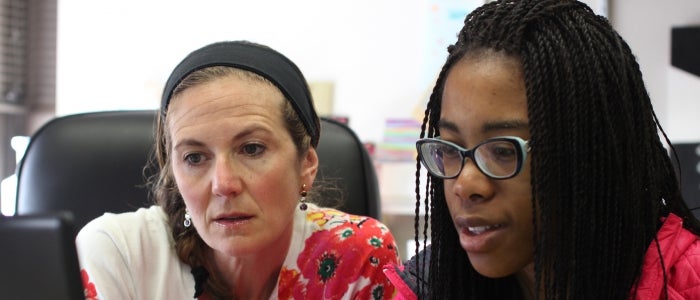
Through the Office of Undergraduate Research, Scholarship, and Creative Activity (OUR), students can begin conducting hands-on research as early as their freshmen year. In the spring of 2016, more than 400 undergraduates performed research with expert faculty members from across all fields and disciplines.
Yet there are many misconceptions about undergraduate research, and students may not understand the breadth of research opportunities available at Pitt. Amanda Gamwo, an undergraduate pursuing the natural sciences and previous First Experiences in Research (FE-R) participant, debunked those misconceptions in a June 2016 article published in PittEd, the School of Education Online Magazine. She writes:
"Through this project, a number of my previous misconceptions about research were clarified.
"Misconception #1: The FE-R program is for students needing to complete research requirements for graduate school.
The First Experiences in Research (FE-R) program helps students attain valuable skills even if they aren’t interested in graduate school. At first, I was interested in the program to list on my resume for graduate school applications. However, I realized that the program had more to offer than checking off a box on my checklist. In the FE-R course, I learned useful research skills, such as how to write an elevator speech and abstract. The one-to-one meetings with my faculty mentor proved more rewarding. She was very collaborative and taught me how to use Excel to code data and how to find statistical significance in research. I had learned about statistical significance in a psychology course, but now I have seen this applied in actual research.
"Misconception #2: Students should choose research projects in their major.
While it may be convenient to choose a research project that directly relates to your major, students can learn from research in other areas. I am planning to complete the natural sciences pre-med degree program. However, I chose this project partly because I believe education opens doors to opportunities, so it is important that high school students attain the writing level needed to move onto college and other professions. I had a lot of help with writing and reading in primary and secondary school. However, not everyone is as fortunate as me. I also realized that writing is an interdisciplinary skill that should be mastered regardless of one’s major.
"Misconception #3: Research is focused a lot on “doing” rather than reading and writing.
When I envisioned research, my imagination turned more to the hands-on activities I would do rather than the critical thinking, writing, and reading aspects of research. Data coding was a large part of the research but I also needed to read related studies. In addition, I needed to write an abstract for the project and a research poster.
"Misconception #4: Most research projects are on science and health issues.
Although it seems like a lot of the research we hear about focuses on science and health issues, I learned that many research projects aim to solve educational issues. In my research project, the educational issue was improving writing instruction for high school students."